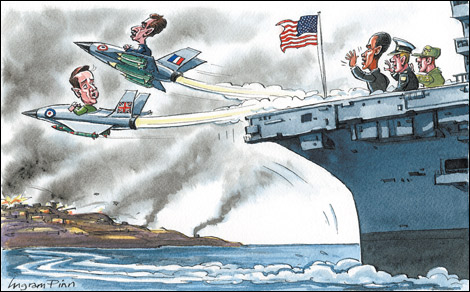
From Philip Stevens, the Financial Times: Nicolas Sarkozy and David Cameron put themselves in the vanguard of diplomacy to stop Libya’s Muammer Gaddafi. When Mr [Barack] Obama eventually consented, he attached a condition: you want it, you can own it.
It is more than half a century since Paris and London embarked on a military adventure together in this part of the world. Then, they were out to prove they were still great powers. Dwight Eisenhower soon put a stop to that. Now Washington is wishing its allies well. Unhappily, the Libyan mission, like Suez, could yet have an uncomfortable ending. …
Mr Obama, though, is clear about the next stage. If US punch was needed to establish the no-fly zone, France, Britain, Spain, Italy and the rest of the coalition must now run it. America, he said this week, cannot solve every problem in the world.
This is as it should be. The Maghreb, after all, is Europe’s long-neglected backyard. The US has a smaller strategic interest; and it has its hands pretty full in Afghanistan. Anyway, haven’t Europeans spent the best part of the past decade complaining that Americans do not properly understand the Arab world. …
The US remains the world’s indispensable power, but it is becoming a more reticent one. Mr Obama’s administration has understood that to be indispensable is not necessarily to be sufficient. The president and Hillary Clinton, his secretary of state, were saying long before Libya that the US can best exercise influence through alliances, networks, coalitions and multilateral institutions. The flip side of the analysis is that it expects more from its partners. (graphic: Ingram Pinn/Financial Times)
Image: ft%203%2025%2011%20%20Ingram%20Pinn.jpg
